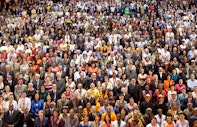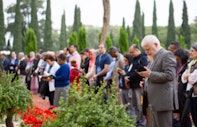What Bahá’ís Believe
Essential Relationships
One Human Family
Articles and Resources
- What Bahá’ís Believe
- Overview
- Bahá’u’lláh and His Covenant
- The Life of the Spirit
- God and His Creation
- Essential Relationships
- Universal Peace
- What Bahá’ís Do
A selection of readings, essays, and resource materials on the subject of the oneness of humanity.
From the Writings and Talks of ‘Abdu’l-Bahá
‘Abdu’l-Bahá’s talks in the French capital covered a wide range of themes including human nature, the soul, the Prophets of God, and racial and religious prejudice. This compilation includes His addresses in Paris as well as selected other materials.
From the Works of Shoghi Effendi
In these three selections from The World Order of Bahá’u’lláh, Shoghi Effendi explains some of the implications of the principle of the oneness of humanity, which “concerns itself primarily with the nature of those essential relationships that must bind all the states and nations as members of one human family.”
From the Guidance of the Universal House of Justice
In 1985, the Universal House of Justice addressed a message to the peoples of the world, inviting them to consider that a new social order can be fostered by all peoples’ seeing themselves as members of one universal family. This message was presented to world leaders and countless others during the United Nations International Year of Peace.
In April 2002, the Universal House of Justice invited the leaders of the world’s religious communities to reexamine the issues lying at the heart of interfaith activity.
Statements
This statement on the concept of global prosperity in the context of the Bahá’í Teachings was commissioned by the Universal House of Justice.
In this statement submitted to the Durban Review Conference Against Racism, Racial Discrimination, Xenophobia and Related Intolerance, April 2009, the Bahá’í International Community stated, “The reality is that there is only one human race. We are a single people, inhabiting one planet: one human family bound together in a common destiny and obligated to ‘be even as one soul’”.
This statement, presented on the International Day for the Elimination of Racial Discrimination, 21 March 2001, explains that a world in which all nations, races, creeds, and classes are closely and permanently united is not a utopian vision but an inevitable and vital necessity.
Despite the widespread acceptance of gender equality in principle—and the advancement of political and civil rights for women in many countries—full equality has not yet been achieved. In this statement issued in 1997, the National Spiritual Assembly of the Bahá’ís of the United States emphasizes the full and equal participation of women in all spheres of life.
Essays
In this paper, first presented at an international conference held in Raziejowice, Poland, in 1989, Wendy M. Heller and Hoda Mahmoudi explore altruism as a major component of social change.
In this article, first published in The Bahá’í World, Volume III, 1928-1930, Louis Gregory explains that there is absolutely no proof to establish the superiority of one racial group over another.
“What the contemporary mind stands greatly in need of is the divorce of the association of uniformity with the notion of the universal,” wrote the American philosopher Alain Locke, ‘Father of the Harlem Renaissance’, in this article, first published in The Bahá’í World, Vol. IV, 1930-1932.
Further Reading
A list of further reading on this subject is available here.







